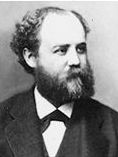It is esp. useful in Paralysis of rheumatic origin, provoked by exposure to a damp and cold atmosphere, particularly when there have been changes from tolerably warm to cold and wet days [Dulcamara]; but it here follows Dulcamara, when the trouble has become chronic.
It may also be indicated in Paralysis following Apoplexy, and in acute spinal Paralysis of the infants.
It is more suited to chronic cases and preferable later, esp. in Paralysis from cold [Causticum, Sul.]
In these different forms of Paralysis Sulphur holds a complementary relation to Rhus.
Silicea [Sil]
It is indicated in Paralysis, when the trouble seems to be due to defective nutrition of the nerves themselves, both in the brain and spinal cord. In this Paralysis the senses are morbidly keen; the brain and spine cannot bear even an ordinary concussion or vibration. The surface of the body is tender and sensitive to touch. Cold aggravates the symptoms and heat relieves.
Stannum [Stann]
It is indicated in Paralysis, mostly left-sided, with perspiration of the affected parts.
It is sometimes used in functional Paralysis, arising from fatigue or from onanism, or from mental emotions [Nat. Mur., Staphysagria]. Sometimes persons of weak, nervous temperament, are so affected by emotions as to lose the power of motion.
Staphisagria [Staph]
It is indicated in Paralysis, with tingling of the affected parts [Aconite, Cann., Ind.].
It is also indicated in Paralysis of one side, from anger.
Sulphur [Sulph]
It is the main antidote when Paralysis results from overdoses of Aconite. In Paralysis following devitalizing affection, it intensifies the action of Apis and in Paralyses indicating Rhus Tox., it holds a complementary relation to Rhus.
It has also done good work in Paraplegia or Paralysis of both legs, with total retention of urine, numbness extending up to the umbilicus and heat of the spine. It must be given persistently here.
Veratria [Verat]
It is indicated in general Paralysis occurring from direct devitalizing of the muscles.
Zincum [Zinc]
It is indicated in Paralysis from enervation and from softening of the brain [Phosphorus, Plum.], following suppressed foot-sweat. The symptoms indicating it are: Vertigo, trembling, numbness and formication, all relieved by friction, and greatly aggravated by wine. There may be marked Ptosis, with this Paralysis.
It is also indicated in partial Paralysis, developed from spinal irritation [Cocc.]. The symptoms indicating it are: Aching in the back at about the last dorsal vertebra, (<)from sitting, than from either walking or lying. Weakness of the legs, esp. at noon, when the patient is angry. All these symptoms are made worse by wine.
Besides the above remedies, Cannabis Ind., Helleborus, Ignatia, Naja, Opium, Picric Acid and Secale may sometimes be needed.

